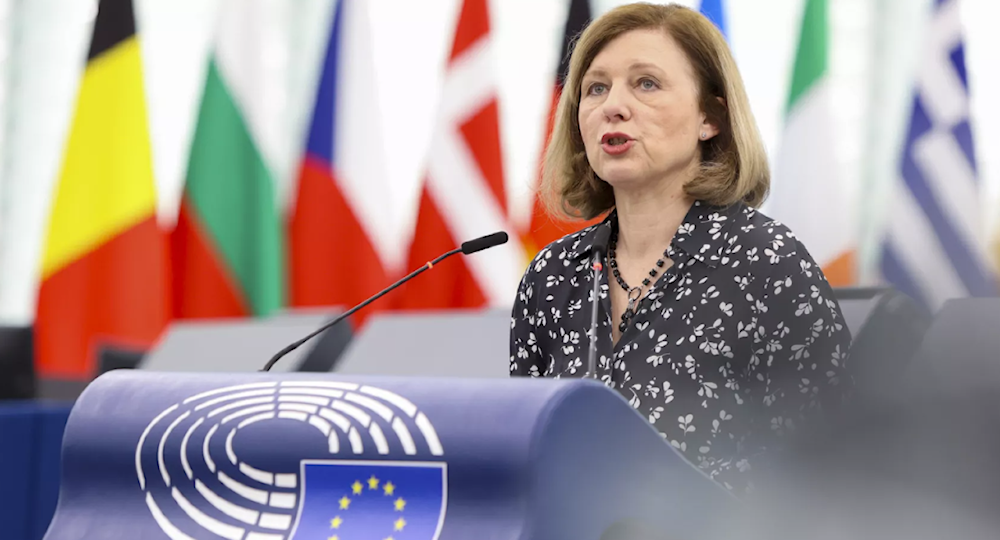EU Parliament votes for media freedom, limiting spying on reporters
The bloc's sweeping new laws were spurred by widespread misinformation, a lack of transparency in media ownership, and increased pressure on journalists.
-

Věra Jourová speaks during the European Parliament debate on the Media Freedom Act, March 13, 2024. (European Union)
The European Parliament gave final approval on Wednesday to groundbreaking new EU legislation aimed at protecting newsroom independence.
The Media Freedom Act, initially proposed by the EU executive in September 2022, was decisively passed on Wednesday, with 464 votes in favor, 92 against, and 65 abstentions.
The Act would require EU states to better safeguard media from malicious influence and ban the use of spyware against journalists. In addition, outlets must provide information regarding ownership, funding, and state advertising in a transparent manner.
The European Board for Media Services, a customized EU agency, would be formed to supervise the regulations' implementation.
The President of the European Chamber, Roberta Metsola, said the chamber had "made history" by passing the Act, which is the first-ever EU rule to protect the free press.
Reporters Without Borders, an NGO, welcomed the action as a "major step forward for the right to information within the European Union."
Today, @Europarl_EN made history.
— Roberta Metsola (@EP_President) March 13, 2024
The Media Freedom Act will safeguard journalists from interference, protects them from revealing sources & ensures transparency of media ownership.
It fights disinformation.
For Daphne. For Ján. For all journalists threatened.
For democracy. pic.twitter.com/VgEhnafVe8
Věra Jourová European Commissioner for Values and Transparency called it a "clear message to those who want to weaken democracy" and make media "dependent on them" with the power of the state.
Sabine Verheyen (Germany, EPP), the main legislator on the issue, stated just before the vote that the Act will allow the media to become more independent of state authorities, despite worries of some countries like Greece, lagging behind.
Verheyen stated that the new European Board will be able to hold both governments and media services accountable by forming impartial opinions and settling disagreements. The parliament had requested that the Board's secretariat be selected separately to ensure independence from the Commission, but this was not feasible.
In reaction to allegations of the use of software, such as Pegasus and Predator, to infiltrate reporters' equipment in Greece, Hungary, Poland, and Spain, the Parliament hoped the bill would impose a complete prohibition on the use of spyware against reporters.
"We would have liked stronger wording when it came to spyware, but that wasn't something we could achieve," Verheyen said.
Reporters surveilled only for 'national security dangers'
However, a few member states, notably France, Italy, Malta, Greece, Cyprus, Sweden, and Finland, have lobbied for an exemption that would allow governments to intercept talks between reporters and their sources in the case of what they dubbed a national security danger.
Verheyen added that under the new legislation, EU countries will only be permitted to deploy spyware against journalists as a "last resort" tool with a legal justification.
Journalists must also be thoroughly notified of the actions taken against them, she continued, but stressed there would be "no restrictions on the investigative work carried out by journalists."
"Changing the way public television works is one of the things that, I think, deserves our attention," she stated.
"Not just the Commission, but anyone who understands that in every country there should be a really strong public service media and not a media that will serve as the mouthpieces of the party and the government."
The Media Freedom Act will now be sent back to the Council before being formally enacted into law.

 3 Min Read
3 Min Read








